Note: This photo essay is dedicated to the memory of community defender and environmental activist Noé Vázquez, who was brutally murdered on Aug. 2, 2013 as he was preparing for his hosting of the opening ceremony for the 10th anniversary celebration of the Mexican Movement of Men and Women Affected by Dams and in the Defense of Rivers (MAPDER) http://www.mapder.lunasexta.org. Text and photos by Jonathan Treat
The blockade is simple, but its implications profound. A thick steel chain across the only bridge entering the small town of Paso de la Reina, municipality of Santiago Jamiltepec of roughly 500 residents on Oaxaca´s southwestern coast, is attended daily by men and women who prevent the entry of anyone connected with a proposed hydroelectric dam project on the Rio Verde. And for four years that strategy has been successful.
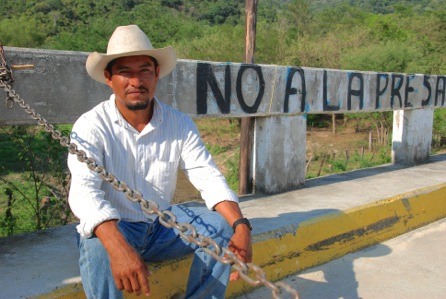
Local community defenders, together with people from other communities and members of Counsel of Peoples United for the Defense of the Rio Verde (COPUDEVER), came together recently at El Zanate, a lush green riverside site near the entrance to the town, to celebrate the fourth anniversary of their ongoing, nonviolent blockade, and their success in halting the project to date.
“We´re here to celebrate this successful and peaceful blockade. Since we decided to put up the blockade at the entrance to our ejido (communal land holding) in July 2009 to prevent anyone from the CFE (Federal Electric Commission) from entering to do their surveys and studies for the project, none of them has been able to do that work. So this is a very significant day, celebrating with our compañeros our decision to put the first stone in the way of the dam project,” explained Eva Castellanos Mendoza, local community activist and a member of COPUDEVER. “And it’s a triumph. The blockade has worked. If it hadn´t been here, I think the CFE would have completed their work and probably started with construction of the dam.”
Engineers from the Mexican Federal Electric Commission (CFE), surveyors and government officials, at times accompanied by police, have all tried on various occasions to pass the blockade—each time without success. CFE engineers even tried to conduct surveys for the project by skirting the blockade and coming upriver in an inflatable motorboat. Townspeople on watch noted their surreptitious attempt and called together a community commission, who confronted them and escorted them out of town—without their boat and surveying instruments.
“They were almost ready to cry because we’d kept their boat and their equipment,” explained Manuel Sánchez Riaño. “They were pleading with us, saying how expensive it was. We gave it all back to them, but told them not to come back.
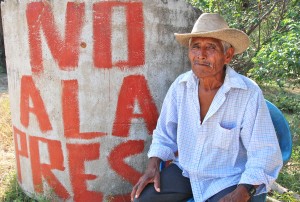
The proposed Mexican government´s CFE “Paso de la Reina Multiple Uses Hydraulic Project“ would have far reaching impacts beyond that community. The Rio Verde, site of the proposed dam, is one of the most biologically diverse and extensive river basins in the state of Oaxaca. And if constructed, the project would directly impact 17,000 residents and indirectly affect another 97,000 in 43 mixteco, chatino, afromexican and mestizo communities in six coastal regions. Vast areas of fertile agricultural lands and access to water sources would be lost, and community defenders and environmentalists argue that the project would be devastating to the local biodiversity of flora and fauna of the region, including the National Park, Lagunas de Chacahua.
Opponents of the proposed hydroelectric project note that in addition to the negative environmental impacts, the loss of agricultural lands would deprive residents of agricultural and fishing areas, forcing many to migrate–often ripping community´s cultural and social fabric. Hence the ongoing and widespread opposition to the project.
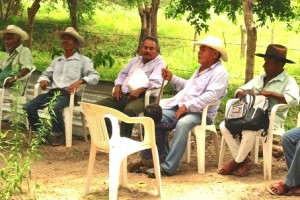
“I´m making this struggle my struggle, along with other compañeros, organizations and people who are defending our communities. One person can’t do much alone, so we´ve had to organize. And our unity with other communities and organizations is very strong now,” said Jesús Villanueva Silva, President of Community Commons (Bienes Comunes) of Tataltepec de Váldez. “We will defend our Madre Tierra (Mother Earth), our water, our land that gives us our food—tooth and nail. We see these things as sacred.”
“This is our territory. This is where we live and work. So we´ve been helping to maintain this blockade. We’ve never stopped, never left this struggle. And we haven’t let anyone from the government or the CFE who wants the dam project to pass this bridge,” added Martiniano Martínez Martínez, Assistant Secretary of the Community Commons (Bienes Comunes), of Tataltepec de Váldez. “And we’ll continue to struggle and defend our territory. No one is going to enter and destroy this land.”
Maintaining the blockade these four years has not been easy. The blockade is manned full-time during daylight hours, meaning time away from work. And there are risks—those opposing the project have consistently been harassed and threatened. Throughout Mexico environmental and community activists have been targets of repression, including assassinations.
“At times the struggle has been difficult and worrisome, but we´ll continue until we´ve won our struggle and stopped this dam,” said Flavio Cruz León, Municipal President of Paso de la Reina. “These are our lands, if we don’t defend them, what will our children think? What will we leave them?”
The blockade at the entrance to Paso de la Reina has been a unifying force for people from the 43 communities in the region that are at-risk of negative environmental, cultural and social impacts of the proposed hydroelectric dam project. Since coming together in 2007 to form COPUDEVER, the grassroots organization has galvanized major resistance and worked to develop effective, nonviolent strategies for stopping the Paso de la Reina hydroelectric project.
But the unity present during the anniversary celebration hasn´t always been there, and has taken years of meetings and organizing to bring communities in the region together. When The Mexican Federal Electric Commission (CFE) project engineers first came to speak with some residents in Paso de la Reina about the many benefits the hydroelectric project would bring—jobs, ecotourism, and development—the residents of the town were divided about whether to accept or oppose the project.
But there has been a consistent lack of transparency regarding the full implications and impacts of mega development projects on communities in Mexico (and beyond). Mexico´s environmental ministry, the Secretariat of Environment and Natural Resources (SEMARNAT) and the National Water Commission (CONAGUA)—incredibly—publicly deny any knowledge of the proposed Paso de la Reina Hydroelectric Project
So, not surprisingly, some residents of Paso de la Reina who´d heard about negative impacts of dam projects in other communities and were suspicious of the CFE´s promises of a rosy future. Others in the community pointed out that a much smaller dam built just below Paso de la Reina in 1992 devastated local fishing in the brackish waters abundant with a diversity of fish by creating a barrier between the river and the ocean. (See video: http://pasodelareina.org/blog/2013/07/16/que-pasara-con-nuestro-rio/).
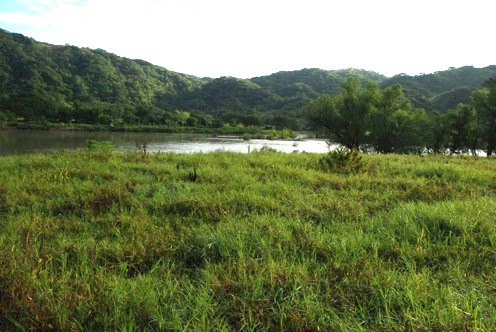
Having seen the negative impacts of a dam firsthand as well as in other communities, concerned residents decided to get more information. They contacted Services for an Alternative Education (EDUCA), a Oaxacan non-governmental organizations known for their work in indigenous and environmental rights and the defense of territories, and invited them to present their information and experiences to residents of Paso de la Reina and other local communities in community forums.
Those wary of the Paso de la Reina had their concerns about false promises and negative impacts confirmed during EDUCA’s community forums. The thousands of jobs that CFE engineers had promised, for example, were illusory. Building and operating a hydroelectric dam mostly requires workers with technical skills, including operating heavy equipment—skills that campesinos and fishermen don´t possess.
And the livelihoods of most people in the region that would be impacted by the dam project come from agriculture—and much of their rich farmlands would be lost with the proposed project.
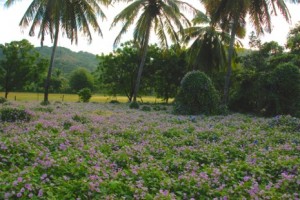
“Those who came to promote the dam tried to deceive us by saying the project would bring lots of jobs. We know from the experience of other communities with these projects that is a lie. For these megaprojects, they use heavy equipment that we as campesinos and laborers don´t know how to operate,” explained Felipe Gomez Cruz, President of the Vigilance Council of Paso de la Reina “We have seen through the promises and we understand very clearly that this megaproject that they call `development´really means the devastation of our community and our lands. So we are defending our patrimony, nonviolently and not breaking any laws. We are defending our lands that feed us.”
Another detail that the engineers failed to mention, but that was revealed in documents acquired by EDUCA, was that a smaller dam below Paso de la Reina was also in the project’s plans. That omission effectively avoided the fact that the entire community of Paso de la Reina would disappear under water.
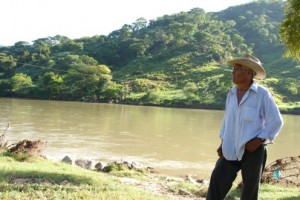
The CFE´s proposed one-billion-usd.-hydroelectric project involves the construction of a 640 feet tall dam just a little over a half-mile above Paso de la Reina, together with a smaller dam one roughly a half-mile below the town, would flood community, together with roughly 5,000 acres of its prime agricultural and forest lands under water. The Paso de la Reina project is just one of many dams and mega-industrial wind farms projects aimed at providing an extensive energy and transportation infrastructure to support the massive Mesoamerican Integration and Development Project (MIDP project. The international “development” scheme would create a vast industrial/maquiladora network from southern Mexico to Colombia. These mega development projects, many funded with loans from the Inter-American Development Bank, have caused massive displacement and forced migration, loss of agricultural lands and of access to water for many communities throughout Mesoamerica.
“We’ve learned over the six years that we started to organize that the government´s and transnationals’ plan is to begin with this megaproject, with the idea of eventually owning one day all that belongs to us,” said Senovio Chávez Quiroz, former Municipal President of Paso de la Reina and an outspoken member of COPUDEVER.
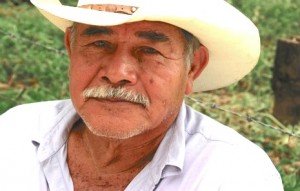
“Essentially they want to privatize the lands of campesinos, turning us into servants of others rather than the owners and caretakers of our own lands,” Chávez said. “Today we are the owners, but tomorrow we’d be other peoples’ slaves. And this is happening throughout our region, and in many other areas. It’s not humane”
During the festivities women several women community leaders addressed the crowd, pointing out the importance of their participation in the struggle. “As one compañera said, we have a voice and a vote. I think the time has come when women have awakened and are using their voices, saying ‘I´m here. I’m also in this struggle to defend life. I´m going to defend the life of nature, of the environment, because as a woman I also create life’,” said Eva Castellanos Mendoza. “So I think that women have played a very important role in this struggle. They are using their voices, and when they decide that they are going to do something, well, they do it.”
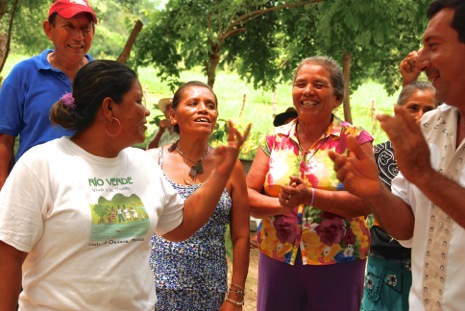
During the July event at El Zanate, local priest Padre José Guadalupe gave a mass celebrating the anniversary of the blockade. “We give thanks to God that people here have been struggling to defend for four years what in good faith and consciousness we all must defend. And while it hasn´t been easy, with the ongoing threats and intimidation, nevertheless you are here constantly maintaining the blockade—and always nonviolently,” Father Guadalupe said. “I’ve seen people have grown in their awareness that their land is something sacred, something that gives them life. The land is a blessing that we have to nurture and something that we can’t let be lost. It is, in the end, what sustains us and what will sustain your children”
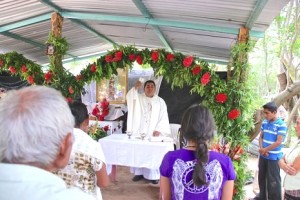
Padre Guadalupe later pointed out that while political parties have consistently sought to divide the movement against the dam project, that the unity among the people has prevented that from happening.
“In spite of the attempts to create divisions, there are people in COPUDEVER from a variety of political parties that are actively participating and resisting because they share a common goal—the nonviolent struggle to defend their lands,” he explained.
Several people pointed out that their struggle against the Paso de la Reina hydroelectric project is just one example of many struggle of peoples to their territories. And they spoke of the importance of building alliances with other struggles against mega development projects—not only locally, but also on national and international levels.
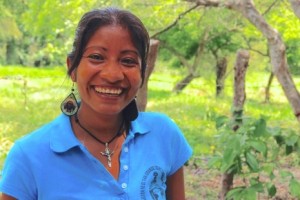
“Everything is connected—those who are fighting against the commercial wind farms, against mining projects—we all have the same goal, to conserve our territories, and to preserve life itself. And I think this is starting to happen on a global level,” said Eva Castellanos Mendoza. “So, yes, there are connections between all of us, because we are dreaming of a better world.”
Jonathan Treat is a journalist, professor, activist and founding member of the non-profit organization, University Services and Knowledge Networks of Oaxaca (SURCO, A.C.) www.surcooaxaca.org. Treat leads SURCO delegations related to defense of territories in Oaxaca and Chiapas. He is a frequent contributor to the CIP Americas Program www.americas.org
Sources:
1) “Informe Público, Paso de la Reina”, Servicios para una Educación Alternativa (EDUCA)
2) “En Rio Verde, Oaxaca, otra batalla por el agua”, La Jornada, July 17, 2013
3) http://pasodelareina.org/blog/2013/07/16/que-Pasara-con-nuestro-rio/
4) Personal interviews, “El Zanate”, Paso de la Reina, July 11, 2013
5) Laboratorio Multimedia para la Ciencias Sociales, UNAM
For more information:
Recent report published by EDUCA (in Spanish): http://pasodelareina.org/blog/2013/07/16/informe-publico-paso-de-la-reina/#sthash.wjUQEAjb.dpuf
Websites:
http://pasodelareina.org/
www.educaoaxaca.org
laventanaoax@yahoo.com.mx
Videos:
“¿Qué Pasará con Nuestro Río?” http://pasodelareina.org/blog/2013/07/16/que-pasara-con-nuestro-rio/
“Comunidades de la costa de Oaxaca en defensa del Río Verde” http://www.youtube.com/watch?v=ikXJhYnZUJo
¿Qué pasará con nuestro río? http://www.youtube.com/watch?v=SpKvvBfL70g



